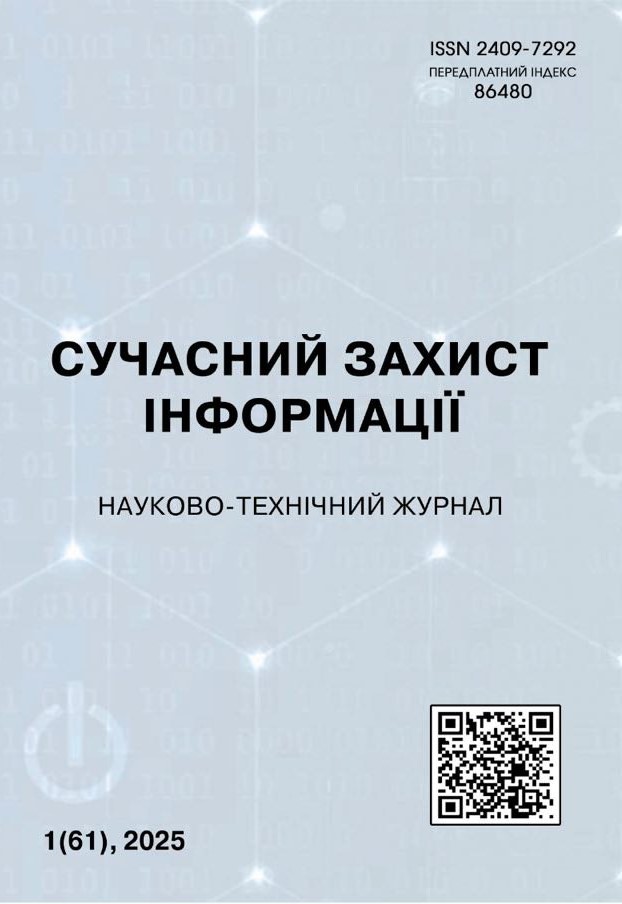ІГРОВІ ІНДЕКСИ В ІНФОРМАЦІЙНИХ ТЕХНОЛОГІЯХ ЗАБЕЗПЕЧЕННЯ МІЖНАРОДНИХ КОМУНІКАЦІЙ: КІБЕРСТІЙКІСТЬ, КІБЕРПОТУЖНІСТЬ ТА КІБЕРБЕЗПЕКА
DOI: 10.31673/2409-7292.2025.016955
Анотація
Запропоновано підхід до оцінювання ефективності міжнародних стратегій кібербезпеки, що базується на
синтезі теорії ігор та кількісному аналізі показників співпраці між державами у кіберпросторі. Автори аналізують
стратегічні рішення країн як раціональних гравців, що вибирають між оборонними та наступальними стратегіями
в кіберпросторі, враховуючи можливості співпраці та конфлікту. Проведений аналіз основних існуючих індексів
кібербезпеки, таких як Global Cybersecurity Index (GCI), National Cyber Security Index (NCSI) та інших, які
оцінюють кіберздатність держав на різних рівнях. Представлено розроблення трьох умовних ігрових індексів:
кібербезпеки, кіберстійкості та кіберпотужності, які дозволяють оцінювати рівень захищеності, відновлюваності
та наступального потенціалу держав відповідно. Також акцентується на важливості розроблення більш гнучких
та точних методів для оцінки кіберможливостей, які враховували б міжнародні взаємодії та політичний контекст.
За основу оцінювання взято матрицю рівня співпраці в кіберпросторі, що відображає рівень взаємної довіри та
готовності обмінюватися даними й технологіями. Методика продемонстрована на прикладі симульованих даних
п’яти країн, для яких обчислювалися згадані індекси на основі модельних матриць взаємодії. Результати свідчать,
що більш інтенсивна та рівномірно розподілена співпраця підвищує як загальний рівень безпеки, так і стійкість
держави до атак, а висока кіберпотужність корелює з лідерством у глобальному кіберпросторі. Запропонований
підхід може застосовуватися для оперативного моніторингу, аналізу слабких ланок у міжнародній кооперації та
сценарного моделювання в умовах динамічно змінних загроз. Стаття прагне внести вклад у покращення
методологічних підходів до кібердипломатії, оцінки кіберпотенціалів держав, використовуючи інструментарій
теорії ігор для розуміння складних міждержавних взаємодій в галузі кібербезпеки та розвитку більш ефективних
стратегій міжнародного співробітництва. Результати дослідження становлять інтерес для кібердипломатів,
фахівців із кібербезпеки, державних органів, аналітичних центрів та міжнародних організацій.
Ключові слова: кібербезпека, теорія ігор, кіберзагрози, кіберстійкість, кіберпотужність, моделювання,
кібератаки, міжнародні комунікації, ігрові індекси, кібердипломатія.
Перелік посилань
1. О. Корченко, Є. Іванченко, О. Бакалинський, Д. Мялковський, Д. Зубков, Метод оцінювання рівня
підвищення стану кіберзахисту об’єктів критичної інфраструктури держави. Наукоємні технології 61 (1), 3-20.
2. О. Гайдук. Кібердипломатія як парадигма нового підходу до міжнародних відносин: досвід країн світу,
науково-академічні практики та кібербезпека міжнародних комунікацій. Монографія "Стратегічні комунікації в
умовах війни: погляд від волонтера до науковця". Національна Академія Служби Безпеки України, Київ, 2024.
3. Von Neumann, J., & Morgenstern, O. Theory of Games and Economic Behavior. Princeton University Press,
1944.
4. Osborne, M. J. An Introduction to Game Theory. Oxford University Press, 2003.
5. Basar, T., & Olsder, G. J. Dynamic Noncooperative Game Theory. SIAM, 1999.
6. Tambe M., Security and Game Theory: Algorithms, Deployed Systems, Lessons Learned. Cambridge
University Press, 2011.
7. Charles A. Holt and Alvin E. Roth, The Nash equilibrium: A perspective Department of Economics, University
of Virginia, Charlottesville, VA 22904-4182; Department of Economics and Harvard Business School, Harvard
University, Cambridge, MA 02138 January 28, 2004.
8. Fiorenzo Mornati, Pareto optimality in the work of pareto. Revue européenne des sciences sociales T. 51, No.
2, Numéro spécial du cinquantenaire: autour de pareto (2013), pp. 65-82 (18 pages).
9. Nisarg Shah, Game Theory : Zero-Sum Games, The Minimax Theorem https://www.cs.toronto.edu
/~nisarg/teaching/304f17/slides/CSC304-L5.pdf https://www.cs.toronto.edu/~nisarg/teaching/304f19/slides/304f19-
L6.pdf
10. Kaifu Zhang, Timothy Van, Theorem of the Maximin and Applications to Bayesian Zero-Sum Games, Feb
2010 Economics and Political Sciences; Centre for Economic Policy Research.
11. Amadi Emmanuuel Chukwudi, Eze Udoka, Ikerionwu Charles. Game Theory Basics and Its Application in
Cyber Security. Advances in Wireless Communications and Networks. Vol. 3, No. 4, 2017, pp. 45-49. doi:
10.11648/j.awcn.20170304.13
12. Chukwudi, Amadi & Eze, Udoka & Ikerionwu, Charles. (2017). Game Theory Basics and Its Application in
Cyber Security. Advances in Wireless Communications and Networks. 3. 45-49.
13. Індекс кібервразливості Cyber Exposure Index – Cyber Exposure Development Environment
14. Рейтинг безпеки Bitsight Bitsight Cyber Security Ratings | Bitsight
15. Худинцев, Микола & Жилін, Артем & Davydiuk, Andrii. (2021). Світові індекси кібербезпеки: огляд та
методики формування (Глобальний звіт / Каталог). Інститут проблем моделювання в енергетиці ім. Г.Є. Пухова
НАН України ISBN: 978-966-136-887-2.
16. Національний індекс кібербезпеки. Академія електронного урядування (eGA)
https://ega.ee/project/national-cyber-security-index/
17. Глобальний індекс кібербезпеки (GCI) Міжнародного союзу електрозв'язку https://www.itu.int/en/ITUD/Cybersecurity/Pages/global-cybersecurity-index.aspx
18. Інструмент оцінки національних стратегій кібербезпеки ENISA https://www.enisa.europa.eu/
tools/national-cybersecurity-strategies-evaluation-tool
19. Cyber Readiness Index (CRI) Potomac Institute for Policy Studies
https://www.belfercenter.org/publication/cyber-readiness-index-20
20. Cybersecurity Capacity Maturity Model for Nations Global Cyber Security Capacity Centre
https://gcscc.ox.ac.uk/the-cmm
21. Voo, Julia, Irfan Hemani, Simon Jones, Winnona DeSombre, Dan Cassidy and Anina Schwarzenbach.
“National Cyber Power Index 2020.” September 2020 https://www.belfercenter.org/publication/national-cyber-powerindex-2020
22. Національний індекс кіберпотужності (NCPI) 2022 https://www.belfercenter.org/publication/nationalcyber-power-index-2022
23. Cam Sivesind, Cyber Powers: Ranking the Top 30 Nations by Capabilities, Intent Sep 27, 2022.
24. 10 Guards, 30 наймогутніших кібердержав світу https://10guards.com/ua/blog/2022/10/10/the-worlds-30-
cyber-superpowers/
25. Індекс кібер можливостей та національної потужності – Cyber Capabilities and National Power (CCNP),
https://www.iiss.org/research-paper/2023/09/cyber-capabilities-national-power-volume-2/
26. Çifci, Hasan, Comparison of National-Level Cybersecurity and Cyber Power Indices: A Conceptual
Framework. 10.21203/rs.3.rs-2159915/v1, 2022. https://www.researchgate.net/publication/364451490_Comparison_
of_National-Level_Cybersecurity_and_Cyber_Power_Indices_A_Conceptual_Framework
27. Axelrod, R. The Evolution of Cooperation. Basic Books, 1984.
28. Eric Rasmusen's book, Games and Information: An Introduction to Game Theory. First Edition: 1989, 344 pp.,
ISBN: 0-631- 15709-3. Second edition: 1994, 478 pp., ISBN: 1-55786- 502- 7. Third Edition, ISBN: 0631215573, 2001.
Fourth Edition, 2006, ISBN:1405136669.
29. Lin, H. S., & Zegart, A. B. (Eds.) Bytes, Bombs, and Spies: The Strategic Dimensions of Offensive Cyber
Operations. Brookings Institution Press, 2019.
30. Kamhoua, C. A., Kwiat, K., & Hurley, P. (Eds.) Game Theory and Machine Learning for Cyber Security. CRC
Press, 2020.

